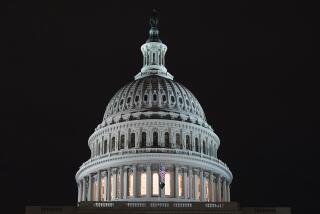U.S. Role in Mideast Helped to Put a Lid on Defense Cuts, Strategists Say : Military: Operation Desert Shield altered the political climate in the negotiations, aides contend. Lawmakers who had called for deep cutbacks were forced on the defensive.
- Share via
WASHINGTON — The political backdrop of the U.S. military deployment in Saudi Arabia played a significant role in limiting defense cuts in Sunday’s budget agreement, halting the military spending “free fall” that some analysts had predicted two months ago, budget aides said Monday.
Capitol Hill strategists said that Operation Desert Shield forged a major change in the political climate of the negotiations, forcing lawmakers who had been advocating deep cuts on the defensive.
While many Democrats were eager to cut more deeply, a Democratic strategist said: “It was just not something they wanted to campaign on a week later. The politics shifted in favor of those who wanted to cut less.”
The defense budget compromise struck by negotiators Sunday would leave not only funding for Operation Desert Shield intact but would spare much of the funding that has been spent each year to prepare for a major Soviet onslaught on Western Europe.
While as much as 60% of the annual defense budget in recent decades has gone toward preparations for a large-scale war in Europe, military spending would shrink by less than 20% by 1995 under the new plan.
Defense Secretary Dick Cheney in January proposed to trim defense spending by 10% over the five years ending in fiscal 1995.
Meeting that target has forced the Pentagon to consider cutting two Navy aircraft carriers, scrapping its nuclear missile modernization plans and reducing the military’s rolls of uniformed personnel--about 2.1 million servicemen and women--by 25%.
By contrast, the accord forged by the White House and congressional leaders would cut the Pentagon budget almost 20% over the next five years.
But while many analysts had called for reductions of 25% and more--and appeared likely to see their recommendations become policy--the crisis in the Middle East has changed that, at least for now.
“Psychologically, (Iraqi President) Saddam Hussein helped build a floor into the defense budget,” said Gordon Adams, director of the Washington-based Defense Budget Project.
“It turned the House of Representatives’ number from a guess to an absolute bottom. Not because the money had anything to do with Desert Shield, but numbers in this town become symbols.
“Politically, it became difficult for people to say, ‘my symbol for my commitment to national defense is a very deep cut.’ The impact was one of political psychology,” Adams said.
Cheney, normally an outspoken critic of such congressional deals, stayed silent on Monday about the plan.
A senior Pentagon official said that Cheney had been involved in drafting the accord and would be “actively working the phones” with lawmakers this week.
But he stopped short of saying that Cheney would lobby in support of the compromise, implying that the defense secretary has reservations about the plan.
As a result of the political impact of the U.S. Middle East deployment, defense negotiators decided to separate funding for Operation Desert Shield from the budget agreement.
By doing so, lawmakers hope to avoid the appearance that their insistence on defense cuts has imposed any further hardship on U.S. troops in and around Saudi Arabia.
But the tactic achieved another purpose, welcomed by lawmakers intent on limiting Pentagon budgets.
By separating $15-billion worth of Middle East operating costs from the 1990 budget, the lawmakers denied the Pentagon the opportunity to “pad” the 1990 budget, which will become the base line against which future growth or shrinkage in defense budgets would be compared.
If the defense budget were $15-billion larger in its base year, then in each subsequent year, the Pentagon would have to ask for more money just to stay even with its last year’s budget.
The larger base would also have made it easier for the Pentagon to claim to have made deeper cuts in subsequent years because of the inflated budget of the base year.
That move, Adams said, will prevent the Pentagon from using Operation Desert Shield to inflate future defense budgets and “throw every weapon under Saddam Hussein’s Christmas tree.”
More to Read
Get the L.A. Times Politics newsletter
Deeply reported insights into legislation, politics and policy from Sacramento, Washington and beyond. In your inbox twice per week.
You may occasionally receive promotional content from the Los Angeles Times.











